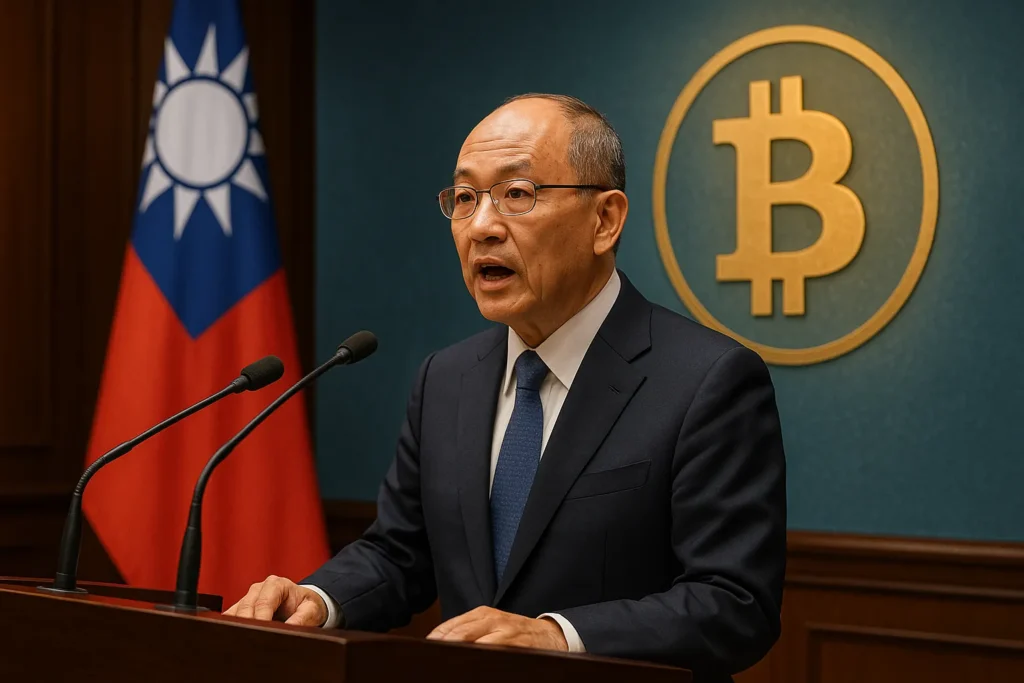Taiwan’s Bitcoin Reserve is a hot issue at the moment. This comes out of a proposal by legislator Ko Ju-Chun for a very large-scale change in our financial structure. He is putting forward a plan to add Bitcoin to the national reserve. This aims to diversify Taiwan’s sovereign wealth. This initiative was put forth at the May 9, 2025 National Conference. It also saw great debate generated in the global financial community regarding the future of the Taiwan Bitcoin Reserve.
The present makeup of the island’s reserve relies on traditional assets. It includes $577 billion in foreign currencies and 423 metric tons of gold. But as per Ko, this approach puts Taiwan at great risk. This includes currency volatility and geopolitical risk. He proposes a 5% Bitcoin allocation out of the $50 billion contingency fund, under the suggested Taiwan Bitcoin Reserve plan.
Taiwan is to address key risks via Bitcoin
Taiwan’s economic success is in large part due to global export which includes semiconductors. But relying on this also brings issues of foreign demand and currency fluctuations. Also, over 68% of our reserves are in U.S. dollars which may be an issue during times of high U.S.-China tension.
Ko has put in place a strategy that uses Bitcoin as a decentralized and censorship-resistant asset. Unlike gold, the Taiwan Bitcoin Reserve proposes Bitcoin for faster settlement and better liquidity. In times of crisis, dollar reserves may only be accessed to a certain degree. On the other hand, Bitcoin enables borderless transfers and P2P transactions.
Taiwan Bitcoin Reserve Offers Strategic Innovation
The lawmaker’s roll out will be structured,
- 5% allocation from reserves planned for Taiwan Bitcoin Reserve
- Legal changes which include Bitcoin as a reserve asset
- Secure storage via licensed domestic custodians
Ko reports that this is not a replacement for gold or fiat but a note to which other stores of value may be added. Also, Taiwan will look to global leaders. These include El Salvador and New Hampshire, which adopted Bitcoin for a different use case rather than as full legal tender.
Bitcoin, which has a 21 million coin cap, fixed issue rate, and transparent blockchain, supports Ko’s argument. Also, he presents it as a main component of Taiwan’s Digital Nation Initiative. This aims to bring in blockchain innovation and foreign direct investment for the Taiwan Bitcoin Reserve’s success.
Taiwan Bitcoin Reserve Faces Key Challenges
Bitcoin’s price volatility is a large issue. To reduce exposure, Ko puts forth dollar cost averaging and options hedging. Also included in the plan are multi-signature custody and travel rule compliance.
Opposition arguments include environmental issues and Bitcoin’s speculative nature. A recent study reported that 62% of Taiwanese citizens see crypto as a risk. But Ko presents different numbers, showing Bitcoin mining is at 59% sustainable energy use. Also, Taiwan’s plan is to play it safe by capping BTC at 5% of reserves, as part of the Taiwan Bitcoin Reserve strategy.
Conclusion
Taiwan’s Bitcoin Reserve project may transform sovereign finance. Should it be put into action, we see it to also bring about economic stability. It aims for tech leadership and financial autonomy in times of geopolitical stress.
Success in that which Taiwan may take its place among the few digital leaders. Also, it may mark a larger trend in which world central banks see world’s central banks not present Bitcoin as a threat. Instead, it is seen as a strategic reserve asset under the Taiwan Bitcoin Reserve framework.

